Celebrating Sri Lanka during South Asian Heritage Month in the UK
We wanted to create an event that offers an immersive experience of Sri Lankan culture, allowing people to be enriched by different aspects of Sri Lankan culture, including food, fashion, comedy, and music
 Inspired by a Sri Lankan charity fundraising event they attended, Ranji Thangiah, Rosh Olivelle and Thana Sivasambu were motivated to organise a celebration of Sri Lankan cuisine, culture, music and fashion as part of the UK's South Asian Heritage Month. The trio are part of a larger group of Sri Lankan women in the creative industry who were brought together by the dynamic Dee Gibson, an interior designer hotelier. The event will be held on Sunday 23rd September at Battersea Barge.
Inspired by a Sri Lankan charity fundraising event they attended, Ranji Thangiah, Rosh Olivelle and Thana Sivasambu were motivated to organise a celebration of Sri Lankan cuisine, culture, music and fashion as part of the UK's South Asian Heritage Month. The trio are part of a larger group of Sri Lankan women in the creative industry who were brought together by the dynamic Dee Gibson, an interior designer hotelier. The event will be held on Sunday 23rd September at Battersea Barge.
 Q: What inspired you to initiate a Sri Lankan-themed event as part of South Asian Heritage Month, and how did the idea for a dedicated day to celebrate Sri Lankan culture come about?
Q: What inspired you to initiate a Sri Lankan-themed event as part of South Asian Heritage Month, and how did the idea for a dedicated day to celebrate Sri Lankan culture come about?
South Asian Heritage Month is a significant annual celebration of South Asian culture in Britain. The initiative seeks to elevate British South Asian history and heritage in the UK through education, arts, culture, celebration, and commemoration. It aims to deepen people’s understanding of the rich and diverse contributions of South Asian communities to British society, promote inter-cultural dialogue, and foster greater social cohesion among our communities.
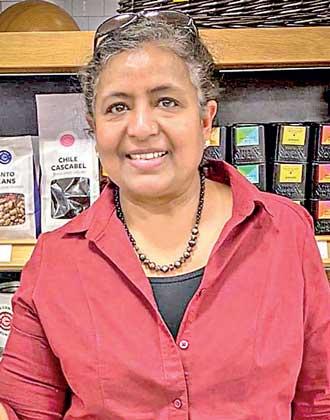
Wandsworth Council has a significant population of South Asians and Sri Lankans and has been a strong supporter of the South Asian community. Each year, the council offers micro-grants for organizations that want to promote cultural events during South Asian Heritage Month.
Q:Could you share the vision and mission behind South Asian Heritage Month and how this event aligns with that vision?
We wanted to create an event that offers an immersive experience of Sri Lankan culture, allowing people to be enriched by different aspects of Sri Lankan culture, including food, fashion, comedy, and music. This is the basis for the Sri Lankan Culture Collective’s one-day boutique festival, an all-day event run by Sri Lankan diaspora women.
Q: What can attendees expect from the Sri Lankan culture day event? Could you highlight some of the key activities and attractions?
People who attend the festival will experience the very best of Sri Lankan culture, which has grown and developed with the Sri Lankan diaspora around London. All the participants we are featuring are emerging talents, and we are proud to provide a platform to showcase them.
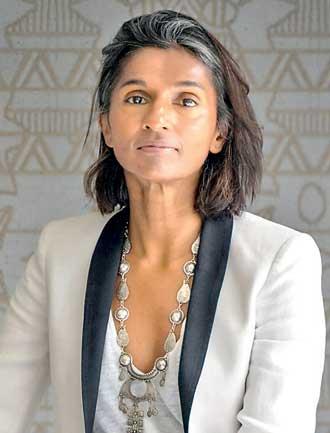
It’s going to be an incredible day with:
- Hopper Making Masterclass - Attendees can learn how to make hoppers, Sri Lanka’s most iconic dish, with Rosh of Hop & Roll. These will be eaten with curries provided by Krish and Joey, the co-founders of the cult Sri Lankan supper club MUVS ALL DAY, along with sambols by the award-winning Sri Lankan artisan food brand Ruci Foods.
- Sari Draping Workshop - Sari maverick and cultural programmer Mehala Ford, founder of the Friday Sari Project will teach attendees how to drape a contemporary sari. Mehala will share the history and significance of the sari and how it continues to impact modern fashion and culture, with the chance to browse some beautiful hand-picked items which includes clothing from The Old Railway a Galle based clothing store, Cherub an emerging batik brand and clothing curated by Mehala from other Sri Lankan brands in the pop-up shop.
- Fireside Chats - There will be talks from founders, tastemakers, creatives, and trailblazers from across the Sri Lankan creative community.
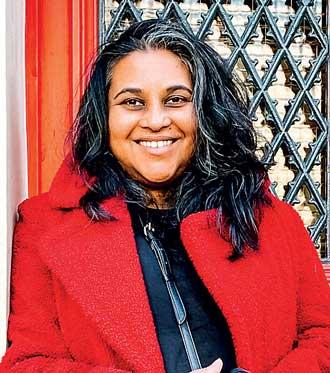 Comedy - The evening programme will kick off with Hari Kanth, a BBC New Comedy Award finalist, comedy writer, director, and stand-up comedian, who will be joined by up-and-coming talent from the South Asian comedy community.
Comedy - The evening programme will kick off with Hari Kanth, a BBC New Comedy Award finalist, comedy writer, director, and stand-up comedian, who will be joined by up-and-coming talent from the South Asian comedy community.
- Street Food - The award-winning Colombo Kitchen, with restaurants in Worcester Park and Putney, will serve up kotthu roti, Sri Lanka’s essential street food and undisputed ‘favorite dish,’ from a live cooking station, with all the theatrical culinary flourishes.
- DJ - On the wheels of steel will be DJ AP, who will mix cutting-edge Tamil music with hip hop and Afrobeat. He has notably played at the Sid Sriram pre-party, GV Prakash in Germany, and an exclusive DJ set for BBC Asian Network.
- Music Performances - There will be live music from an array of phenomenal contemporary Sri Lankan artistes showcasing music from across the diaspora, from the folky acoustic soul of Arjun Nala to the ethereal electronica of performer and musician Toulip Wonder, and the multi-genre sounds of musician, producer, and singer Nush.
The news about
Sri Lanka often focuses on the country’s hardships, which we cannot deny. Yet, at the same time, Sri Lanka has a bright, rich, and diverse culture that continues to develop. And we’re proud of it. We want people to tap into that, feel the energy
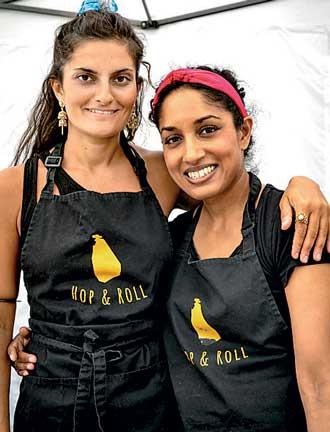 Q: Have you collaborated with any Sri Lankan community groups or individuals in planning this event? If so, how have these collaborations enriched the event?
Q: Have you collaborated with any Sri Lankan community groups or individuals in planning this event? If so, how have these collaborations enriched the event?
We’ve collaborated with HERA Project X Sri Lanka, an initiative set up to showcase Sri Lankan creativity in order to reframe and update the narrative about Sri Lanka. HERA Project X was started by award winning Dee Gibson, a British Sri Lankan designer and founder of boutique hotel Kalukanda House in Sri Lanka.
Sri Lanka, with a rich cultural heritage fusing indigenous and colonial aspects, is often portrayed as a developing economy solely reliant on global markets to stay afloat. The reality is a dynamic, innovative population that is vibrant and forward-thinking, driven by a power base of creative entrepreneurs. HERA Project X shines a light on these entrepreneurs on the island and from the global diaspora, who are collaborating through events, evolving new products, and creating ideas that serve at an international level. The initiative aims to showcase the true Sri Lankan story, how we sit in the 21st Century, and the impact we make.”
Q: How have you engaged with the Sri Lankan diaspora in the UK to bring authenticity and diversity to the event?
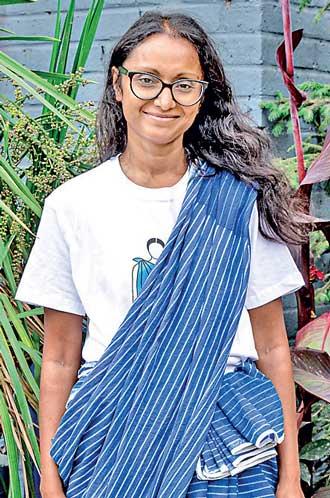
As part of the programming, we created a digital programme for South Asian Heritage Month, working with many people from within the Sri Lankan diaspora to bring this to life.
Indy Vidyalankara, a high-profile Sri Lankan music PR professional with 25 years in the music industry, acclaimed in PR Week’s Top 10 three years in a row, compiled a fantastic playlist that covers the whole of the Sri Lankan diaspora.
Our playlist, featuring over 20 Sri Lankan artistes, bursts with beautiful songs, ranging from classic sounds to beats, bangers, pop, electronic, avant-garde, and alt-soul, showcasing and celebrating the best talent from Sri Lanka to the world!
Documentary maker Jei Planivel shared his short documentary about Kool.
Food writer and podcaster Ranji Thangiah, aka Tooting Mama, created special South Asian Heritage Month podcast episodes of ‘Tea with Tooting Mama.’ She spoke to Rosh Olivelle from Hop & Roll, Thana Sivasambu from Ruci Foods, and Krishanthi Puwanarajah from Muvs All Day about their Sri Lankan heritage, culture, and food.
Likewise, with the event, we’ve brought together talent from across our diaspora to show how diverse we are as a community. But what unites us is being Sri Lankan, living in the UK, and being proudly passionate about our heritage and culture.
Q: What were some of the biggest challenges you faced while organizing this event, and how did you overcome them?
I would say timing has been our biggest challenge. The announcement of the grant was delayed, which ate into our planning time. We worked around this by putting together the digital cultural programme to run during South Asian Heritage Month so we could focus on organising the event.
We needed a venue that allowed us the flexibility to deliver all parts of our programme, from a cooking masterclass to live music, and it had to be in Wandsworth. When we found the Battersea Barge, we knew we had found our venue. It’s on the River Thames, in London’s newest quarter, Battersea, with a beautiful riverscape.
We started promoting our event before we found the venue by opening a waitlist to start putting together a list of people who were just as excited as we were about this event.
There have been lots of smaller challenges thrown at us, but we’ve been flexible, adapted, accommodated, and pressed on with organising the event.
Q: Have you noticed any particular trends or changes in how South Asian culture, especially the Sri Lankan community, is perceived and celebrated in the UK over the years?
Sri Lanka has become more accessible, and more people are choosing the country as a holiday destination, prompting curiosity about the culture as people seek out where to experience food.
The second-generation Sri Lankans, those brought up in the UK, are starting to stamp their own identity onto their culture. It’s a culture informed by their heritage and upbringing in the UK. For example, we see more and more pop-ups and supper clubs with a mixed heritage menu. Krish and Joey, the co-founders of MUVS ALLDAY, are an example of this. Their supper club menu was a mix of modern British and traditional Sri Lankan, and it worked.
We are seeing more and more Sri Lankans break into creative careers. For instance, we have DJs like AP Pistol, who is playing at the Sri Lankan Culture Collective festival, and Suren Seneviratne, aka My Panda Shall Fly, who is a world-renowned DJ. Sachini Imbuldeniya heads up the award-winning creative agency House of Oddities.
In the fashion industry, Mehala Ford is the founder of the Friday Sari Project, a concept store and cultural space that was the first of its kind in the UK. Established in 2018, the store showcases contemporary fashion, design, and culture from India and Sri Lanka, complemented by a curated programme of cultural events.
This is what the Sri Lankan Culture Collective wants to tap into, elevate, and promote.
Q: How does the event aim to showcase the depth and richness of Sri Lankan culture, particularly to those who may not be familiar with it?
The news about Sri Lanka often focuses on the country’s hardships, which we cannot deny.
Yet, at the same time, Sri Lanka has a bright, rich, and diverse culture that continues to develop. And we’re proud of it.
We want people to tap into that, feel the energy and vibrancy, and perhaps shift the narrative to show Sri Lanka as a dynamic, evolving culture.
Q: What do you hope people will learn or appreciate about Sri Lankan culture after attending this event?
When we look from the outside into another culture, we never really appreciate its depth. I hope that through this event, whether people decide to attend a cooking class, the sari workshop, the talks, or enjoy an evening of comedy and music, they feel touched by Sri Lankan culture and gain an appreciation of what we’re about through our personal stories and histories.
Q: Food often plays a central role in cultural celebrations. What kind of Sri Lankan dishes can attendees look forward to, and how were they selected?
Food is a big part of Sri Lankan culture, which is why we’re delighted to have Rosh from Hop & Roll, who will be running a masterclass on how to make hoppers. People attending the class will learn how to prepare the batter, cook their hoppers, and eat them in the traditional Sri Lankan way with curries by MUVS All Day.
Rosh has brought Sri Lankan street food to London, appearing at pop-ups and venues like Mercato Metropolitano. We want to elevate Sri Lankan food, and Rosh is doing just that.
We also have Colombo Kitchen, the award-winning restaurant in Putney and Worcester Park, who will be serving up kotthu roti. The theatre of how it’s made, the sound of chopping it all together, is quite something!
Q: How do you envision the future of the Sri Lankan Culture Collective? Are there any plans for future events or collaborations?
We are talking to people about other events, and with the right support and funding, we want to make it happen. Watch this space!
Q: Fashion is a powerful expression of culture. What kind of Sri Lankan fashion will be highlighted at the event, and who are some of the designers or artists involved?
We’re proud to have Mehala Ford at our event. She’s a fashion pioneer. Mehala was born in Sri Lanka and raised in the UK. She is a creative entrepreneur with over 20 years of experience in the fashion industry.
She studied at the London College of Fashion and, in the 90s, worked with designers like Alexander McQueen and at the height of the British high street. Mehala has serious fashion credibility.
Mehala is a serial creative entrepreneur who has founded several creative platforms, notably the Friday Sari Project (FSP) concept store and space, which showcases contemporary South Asian design and culture.
As a champion of sari through her own personal journey of connection, she teaches and modern sari drapes and styling to encourage the continuity of sari wearing and the craft of sari.
In addition, we will have a pop-up shop with a special Sri Lankan edit of brands and products. You will be able to buy gifts, fashion and accessories.
Q: Are there any notable performers or artists who will be making an appearance at the event?
All our artists are emerging or established talents.
Hari Kanth is a Sri Lankan comedy writer, director, and stand-up comedian. He was the BBC's. He will be joined by up-and-coming talent from the South Asian comedy community.
AP is a Tamil DJ who mixes hip-hop with Afro beats. He’s played at the Sid Sriram pre-party, GV Prakash in Germany, and an exclusive DJ set for BBC Asian Network.
We have live music from some incredible Sri Lankan artists. Arjun Nala plays folky, acoustic soul, rousing, and ethereal electronica. There will also be performances by Toulip Wonder, a performer and musician, and the multi-genre sounds of musician, producer, and singer Nush.
Q: What impact do you hope this event will have on the local community of Sri Lankans?
In 2023, there was the fundraising event, Resilience. After that event, we felt that we had tapped into something new—a new Sri Lankan energy—created by a younger generation who had grown up in the UK. It felt new, different.
The Sri Lankan Culture Collective is an extension of that, and we’ve broadened the remit. In addition to food and music, we’ve added fashion and comedy. We want the local Sri Lankan community to feel that energy, to know this is them, for them, something they can be proud of and show their friends and say, "I’m Sri Lankan, this is what we are!"
Q: Looking forward, how do you see South Asian Heritage Month evolving? Are there any specific goals or expansions you’re aiming for in the coming years?
Since we put out the first announcement about what we are doing, we knew this would be something special. The feedback so far has been amazing; there’s a sense that people want something like this because it reflects their experience of who they are.
And after the recent riots in the UK it’s become much more urgent to put a stamp on our culture and say, "This is us."
We’d love to do this again, extend it a bit further, perhaps with more acts and more participatory events. I mean, if we could get Usha Jey to lead a hip-hop hybrid Bharatham session, perhaps a fashion show, a food village... The possibilities are only limited by our imagination!
Q: On a personal level, what does this event mean to each of you as founders? Do you have personal ties to Sri Lanka or particular aspects of its culture that resonate with you?
Ranji - This event means a lot to me. I’m very much London born and bred, my Sri Lankan-ness is there but has never really come to the forefront of my identity. Connecting with other like-minded Sri Lankans who share my passion for food and the creative arts has helped me tap into my Sri Lankan identity and it’s been brilliant. This has started to influence my writing, my photography and I’m using my podcast to elevate and share other Sri Lankan people’s stories.
Q: What legacy do you hope South Asian Heritage Month will leave for future generations, both within the South Asian community and beyond?
We’d love to see the Sri Lankan community have a bigger presence within the South Asian Heritage Month narrative. Our community is hugely diverse, made up of a range of ethnicities and religions, and that’s something to celebrate. We want the younger generation to own their Sri Lankan identity and express it in any way they want.
Q: If there was one message you hope attendees take away from the Sri Lankan Culture Day, what would it be?
It’s great to be Sri Lankan!
 Inspired by a Sri Lankan charity fundraising event they attended, Ranji Thangiah, Rosh Olivelle and Thana Sivasambu were motivated to organise a celebration of Sri Lankan cuisine, culture, music and fashion as part of the UK's South Asian Heritage Month. The trio are part of a larger group of Sri Lankan women in the creative industry who were brought together by the dynamic Dee Gibson, an interior designer hotelier. The event will be held on Sunday 23rd September at Battersea Barge.
Inspired by a Sri Lankan charity fundraising event they attended, Ranji Thangiah, Rosh Olivelle and Thana Sivasambu were motivated to organise a celebration of Sri Lankan cuisine, culture, music and fashion as part of the UK's South Asian Heritage Month. The trio are part of a larger group of Sri Lankan women in the creative industry who were brought together by the dynamic Dee Gibson, an interior designer hotelier. The event will be held on Sunday 23rd September at Battersea Barge.  Q: What inspired you to initiate a Sri Lankan-themed event as part of South Asian Heritage Month, and how did the idea for a dedicated day to celebrate Sri Lankan culture come about?
Q: What inspired you to initiate a Sri Lankan-themed event as part of South Asian Heritage Month, and how did the idea for a dedicated day to celebrate Sri Lankan culture come about? Wandsworth Council has a significant population of South Asians and Sri Lankans and has been a strong supporter of the South Asian community. Each year, the council offers micro-grants for organizations that want to promote cultural events during South Asian Heritage Month.
Wandsworth Council has a significant population of South Asians and Sri Lankans and has been a strong supporter of the South Asian community. Each year, the council offers micro-grants for organizations that want to promote cultural events during South Asian Heritage Month. It’s going to be an incredible day with:
It’s going to be an incredible day with: Comedy - The evening programme will kick off with Hari Kanth, a BBC New Comedy Award finalist, comedy writer, director, and stand-up comedian, who will be joined by up-and-coming talent from the South Asian comedy community.
Comedy - The evening programme will kick off with Hari Kanth, a BBC New Comedy Award finalist, comedy writer, director, and stand-up comedian, who will be joined by up-and-coming talent from the South Asian comedy community. Q: Have you collaborated with any Sri Lankan community groups or individuals in planning this event? If so, how have these collaborations enriched the event?
Q: Have you collaborated with any Sri Lankan community groups or individuals in planning this event? If so, how have these collaborations enriched the event? As part of the programming, we created a digital programme for South Asian Heritage Month, working with many people from within the Sri Lankan diaspora to bring this to life.
As part of the programming, we created a digital programme for South Asian Heritage Month, working with many people from within the Sri Lankan diaspora to bring this to life.